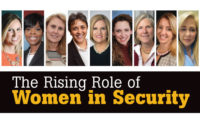Today’s security professional is part of a multicultural workforce and represents a wide variety of ethnic, racial, religious and gender backgrounds. Looking back, in 1990, there were very few women working in the security sector. Flash forward to 2021, and many women are gravitating to the field who are attracted to the wide array of opportunities that are available.
Security is one of the fastest-growing professional careers worldwide. Career prospects range from entry-level security officer and administrative positions to system integration specialists and private investigators to directors of security at corporations and organizations around the world. Terrorism, economic crime, identity theft and workplace violence have led to increased demand for security services. Global security service revenues are forecast to rise 3.6% per year to $263 billion in 2024, according to Freedonia.
While security is not a sector that many women have traditionally considered to build their careers, the landscape has shifted dramatically. It has been an evolution rather than a revolution that has attracted the diverse population of employees who now serve as our country’s security professionals. The issues and threats that exist today are quite different than those of 20 years ago, as is the demand for a multicultural and diverse workforce to creatively and collaboratively address them.
Historically, physical security services companies sought to hire people with law enforcement and military background. While this background is an important part of the mix of any successful security company, today’s security professional comes from many different industries including hospitality, staffing, technology, corporate and more. Why is this an important development for the industry, as well as a catalyst to attract more women?
The greater the mix of talent, with a focus on diversity and inclusion, the stronger the physical security sector becomes. A new generation of young professionals are joining the industry who may not have considered security as a career path even 10 years ago.
For example, Dawn Wheeler currently oversees a large branch at a leading physical security services company after working 25 years in the hospitality sector in management positions at First & Goal Hospitality, Aramark and Delaware North.
Today’s Security Leaders
Wheeler made the jump from hospitality to the security sector as she was impressed by the leadership in the sector and the ability to grow and develop young professionals in their career path and journey.
“Growing up in the restaurant and hospitality industry allowed me to cultivate my passion for leadership and community,” Wheeler says. “Throughout my personal and professional journey, I have been able to carry these life lessons with me as the foundation of who I am, and employ these values to build winning teams. The physical security sector understands that security officers are the bread and butter of the industry. Most importantly, we need to cultivate the talents of our officers and work with them to ensure their upward career trajectory.”
Maureen S. Rush, M.S., CPP, Vice President for Public Safety and Superintendent of Penn Police at the University of Pennsylvania, believes that to be really successful in the security sector, a 24/7 commitment must be embraced.
“Anyone signing up for a career in public safety or policing must realize that you are never really off the clock,” she says. “The higher up you go, the buck stops with you, and to be successful, you need to be able to manage great people and keep in touch so that when there is a disruption on campus, you have the information and resources available to communicate and mitigate the situation.”
Prior to coming to the University of Pennsylvania, Rush had a distinguished 18-year law enforcement career with the Philadelphia Police Department. She served in various positions, namely: the Patrol Division, the Anti-Crime Unit, the Traffic Division, the Narcotics Unit, and the Training Bureau. In 1976, Rush was one of the first 100 women police officers hired to serve the City of Philadelphia on “street patrol” in a pilot program directed by the United States Department of Justice. Women now comprise 25% of the Philadelphia Police Department, with approximately 1,650 officers, as a result of that successful pilot program.
Rush patrolled a very rocky road to ensure a place for women in law enforcement and security.
“When I started in law enforcement, there were virtually no women on patrol. Women were assigned to the Juvenile Aid division and brought out on occasion to act as decoys for purse snatchers,” she shares.
A class action lawsuit filed on February 12, 1974 by Policewoman Penelope Brace alleged that the Philadelphia Police Department was engaged in a pattern or practice of employment discrimination against females in violation of Title VII of the Civil Rights Act of 1964. Brace’s legal victory led to the hiring of 100 women to patrol the streets. Rush was assigned to the 25th District, a high crime district.
“They wanted us to fail and assumed we would,” Rush recalls. “The senior officers engaged in mean-spirited and dangerous hazing to the women on the force. Unlike male rookies who worked in patrol cars with veteran officers, women were assigned street beats to work alone in the most dangerous neighborhoods. They assumed, by the time the winter season approached, we would be fired or would quit. No uniforms were made for us. The first hundred women on patrol in Philadelphia were all dressed in men’s clothes.”
Career Flexibility
With women such as Rush pioneering a path into law enforcement and security for women, the security universe, today, fully embraces and welcomes women. Careers in physical security go beyond traditional guarding and include paths in technology, human resources, marketing, sales and management.
LaDonna Yancy has worked in the physical security sector for 23 years, rising to the rank of Vice President at a leading physical security services firm. Yancy’s path in the physical security sector began as a residential security officer.
“I didn’t join this sector to be ‘boots on the ground,’” Yancy says. “I wanted to go behind the scenes into the investigations and on the management side.” She never sought promotions.
“Managers continually signaled me out, asking me to consider more responsibility and new positions,” Yancy says. “I’ve been continually recognized and awarded by men and women in management.”
However, despite Yancy’s quiet ascent, the frequent business travel that the Vice President post required proved to be a turning point.
“I resigned from the company,” she says. “However, that resignation meeting turned into multiple meetings with my manager. Next thing you know they presented another career opportunity to me that met all my professional and personal needs.” Today, Yancy is serving as an Enterprise Project Manager.
“I didn’t even know this position existed,” she recalls. “There wasn’t a dry eye in my house after my family learned what the company did for me in offering me this new position.”
In today’s business world, the successful team is a diverse blend of the best men and women. As the security industry continues to evolve and tap into the greatest talent and resources, we will continue to see more women as senior leaders, middle managers and new entrants to the field. The security sector offers unparalleled opportunity across multiple disciplines.
“Women should not be caught in the old mythology about what she can or cannot do,” Rush says. “Women should know that there is nothing they cannot do if they set their mind to it.”





